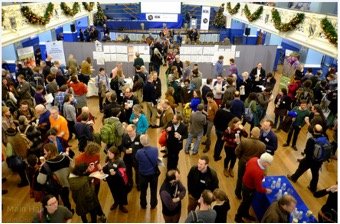Urgenci was present at the “Oxford Real Farming Conference” (ORFC) in Britain, a conference that started as a small alternative conference to the “Oxford Farming Conference” (supported in 2017 by Bayer, BASF and others) but that now has overtaken the conventional farming conference in both the number of delegates and in twitter posts. ORFC actually was number 48 on the global twitter post ranking on 5th of January! Several attendees described it as the central meeting point in the UK for agroecological farming. It is organised by the Real Farming Trust, and the interest in the conference is now enormous.
 The venue, the Oxford Town Hall, looked like something from a Harry Potter movie, and was sold out and packed with 850 delegates, many of them farmers. And indeed the program inclded lots of practical farming themes like “low-stress handling of animals” and “land beyond the plough” as well as the strong presence of the food sovereignty movement through workshops organised by the Landworkers Alliance, UK member of Via Campesina.
The venue, the Oxford Town Hall, looked like something from a Harry Potter movie, and was sold out and packed with 850 delegates, many of them farmers. And indeed the program inclded lots of practical farming themes like “low-stress handling of animals” and “land beyond the plough” as well as the strong presence of the food sovereignty movement through workshops organised by the Landworkers Alliance, UK member of Via Campesina.
In the opening address, Olivier de Schutter spoke of the need to develop a people’s food policy and identified a clear need for change in land management practice and food production.
 The debate about the future of farming in Britain after Brexit was highly interesting. Simon Fairlie presented policy objectives and action points to promote “sustainable, human-scale farming, accessible to a wider section of the population and supporting a more varied and flourishing rural economy”. This could change such things as subsidies aimed at a whole (holistic) farm management scheme, taxing meat, exempting agriculture from any free trade agreement, and establishing a cross-sectoral national food policy etc.
The debate about the future of farming in Britain after Brexit was highly interesting. Simon Fairlie presented policy objectives and action points to promote “sustainable, human-scale farming, accessible to a wider section of the population and supporting a more varied and flourishing rural economy”. This could change such things as subsidies aimed at a whole (holistic) farm management scheme, taxing meat, exempting agriculture from any free trade agreement, and establishing a cross-sectoral national food policy etc.
 Urgenci was involved in the workshop “Access to land and Community Supported Agriculture (CSA)” which looked at the various ways in which CSA is linked to the issue of access to land for agroecological farming. E.g., how does CSA enable land access in an increasingly difficult market? What relation do land access initiatives have with CSA? Examples from Europe and the UK were presented to the 80 participants by host Peter Volz (Urgenci CSA Research Group, Access to Land Network) and panel speakers Steph Wetherell (Sims Hill CSA, Beacon Farms) from Bristol, CSA farmer Gavin Bridger (Farnham local food) and Helen Holmes (Cambridge Crop Share).
Urgenci was involved in the workshop “Access to land and Community Supported Agriculture (CSA)” which looked at the various ways in which CSA is linked to the issue of access to land for agroecological farming. E.g., how does CSA enable land access in an increasingly difficult market? What relation do land access initiatives have with CSA? Examples from Europe and the UK were presented to the 80 participants by host Peter Volz (Urgenci CSA Research Group, Access to Land Network) and panel speakers Steph Wetherell (Sims Hill CSA, Beacon Farms) from Bristol, CSA farmer Gavin Bridger (Farnham local food) and Helen Holmes (Cambridge Crop Share).
Peter gave an introduction and showed various examples from different European examples outlining different levels how land and CSA are connected. This ranges from CSAs making it easier for new and existing farmers to access land by providing a supportive community of consumers that can provide finance, a guaranteed market and distribution to CSAs ensuring that existing farms are not lost and can even potentially grow.
Steph pointed out that land is not a commodity but a cultural link and she explained how in the case of Bristol, the social, environmental and local economic approach of the CSA concept ticked all the boxes for the municipality when searching for a tenant for the public land.
Gavin Bridger showed the challenges for CSA initiatives to find appropriate land with access to the community. Not only does the soil quality matter, but also the land needs to be within reach for the CSA members to pick up boxes and help on the farm. This has been an issue for Gavin’s project.
Helen explained through her personal story how CSA can ac tually be an entrance to farming. She started as a member but over the years has learned so much that she trained and became a CSA farmer herself.
tually be an entrance to farming. She started as a member but over the years has learned so much that she trained and became a CSA farmer herself.
The workshop continued with lively discussions, the audience brought up many questions as well as their own experiences. The demand was so high that even after the conference, information on support for CSA in the UK and Urgenci’s publications were send to all participants.


